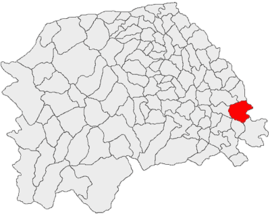Liteni (German: Leiten)[3] is a town in Suceava County, northeastern Romania. It is situated in the historical region of Western Moldavia. Liteni is the ninth-largest urban settlement in the county, with a population of 8,878 inhabitants, according to the 2021 census. It was declared a town in 2004, along with seven other localities in Suceava County. The town administers five villages, namely: Corni, Roșcani, Rotunda, Siliștea, and Vercicani.
Liteni | |
|---|---|
 St. Nicholas church in Liteni | |
 Location in Suceava County | |
| Coordinates: 47°31′12″N 26°31′55″E / 47.52000°N 26.53194°E | |
| Country | Romania |
| County | Suceava |
| Government | |
| • Mayor (2020–2024) | Tomiță Onisii[1] (PNL) |
Area | 72.63 km2 (28.04 sq mi) |
| Elevation | 235 m (771 ft) |
| Population (2021-12-01)[2] | 8,878 |
| • Density | 120/km2 (320/sq mi) |
| Time zone | EET/EEST (UTC+2/+3) |
| Postal code | 727335 |
| Area code | (+40) 02 30 |
| Vehicle reg. | SV |
| Website | www |
| Year | Pop. | ±% |
|---|---|---|
| 2002 | 9,851 | — |
| 2011 | 9,398 | −4.6% |
| 2022 | 8,878 | −5.5% |
| Source: Official Romanian census data | ||
Liteni is located in the south-eastern part of Suceava County, near the confluence of the Suceava River and the Siret River. The town of Dolhasca is nearby. Despite being a town, Liteni has a rural aspect in many areas and the main occupation of its inhabitants is agriculture.
Administration and local politics
editTown council
editThe town's current local council has the following political composition, according to the results of the 2020 Romanian local elections:[4]
| Party | Seats | Current Council | |||||||||||
|---|---|---|---|---|---|---|---|---|---|---|---|---|---|
| National Liberal Party (PNL) | 11 | ||||||||||||
| Social Democratic Party (PSD) | 3 | ||||||||||||
| People's Movement Party (PMP) | 2 | ||||||||||||
| Independent (Ceornei Gheorghe) | 1 | ||||||||||||
References
edit- ^ "Results of the 2020 local elections". Central Electoral Bureau. Retrieved 9 June 2021.
- ^ "Populaţia rezidentă după grupa de vârstă, pe județe și municipii, orașe, comune, la 1 decembrie 2021" (XLS). National Institute of Statistics.
- ^ Franz Adolf Wickenhauser: Moldawa oder Beiträge zu einem Urkundenbuche für die Moldau und Bukovina. Heft 1: Die Urkunden des Klosters Moldowiza. Jacob & Holzhausen u. a., Wien u. a. 1862, S. 212.
- ^ "Rezultatele finale ale alegerilor locale din 2020" (Json) (in Romanian). Autoritatea Electorală Permanentă. Retrieved 2020-11-02.
External links
edit- (in Romanian) Liteni Town Hall official site
- (in Romanian) Suceava County site – Liteni web page

